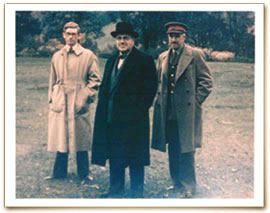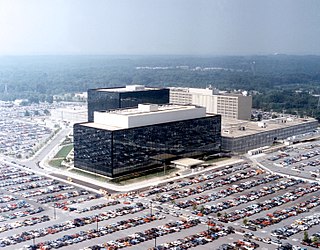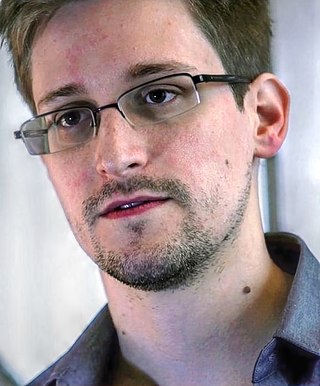Related Research Articles

ECHELON, originally a secret government code name, is a surveillance program operated by the five signatory states to the UKUSA Security Agreement: Australia, Canada, New Zealand, the United Kingdom and the United States, also known as the Five Eyes.

Government Communications Headquarters, commonly known as GCHQ, is an intelligence and security organisation responsible for providing signals intelligence (SIGINT) and information assurance (IA) to the government and armed forces of the United Kingdom. Primarily based at "The Doughnut" in the suburbs of Cheltenham, GCHQ is the responsibility of the country's Secretary of State for Foreign and Commonwealth Affairs, but it is not a part of the Foreign Office and its Director ranks as a Permanent Secretary.

The United Kingdom – United States of America Agreement is a multilateral agreement for cooperation in signals intelligence between Australia, Canada, New Zealand, the United Kingdom, and the United States. The alliance of intelligence operations is also known as the Five Eyes. In classification markings this is abbreviated as FVEY, with the individual countries being abbreviated as AUS, CAN, NZL, GBR, and USA, respectively.

Sir Edward Wilfred Harry Travis was a British cryptographer and intelligence officer, becoming the operational head of Bletchley Park during World War II, and later the head of GCHQ.
Sir David Edwin Pepper KCMG is a British civil servant who was the director of the Government Communications Headquarters (GCHQ), the British signals intelligence agency, from 2003 to 2008.

The Five Eyes (FVEY) is an intelligence alliance comprising Australia, Canada, New Zealand, the United Kingdom, and the United States. These countries are parties to the multilateral UKUSA Agreement, a treaty for joint cooperation in signals intelligence. Informally, Five Eyes can also refer to the group of intelligence agencies of these countries.
Mastering the Internet (MTI) is a mass surveillance project led by the British communications intelligence agency Government Communications Headquarters (GCHQ) budgeted at over £1 billion. According to reports in The Register and The Sunday Times in early May 2009, contracts with a total value of £200m had already been awarded to suppliers.
The Director of the Government Communications Headquarters is the highest-ranking official in the Government Communications Headquarters (GCHQ), a British intelligence agency that specialises in signals intelligence, information assurance and cryptography. The director is a Permanent Secretary, and appointed by and reports to the Secretary of State for Foreign and Commonwealth Affairs.

Robert Peter Hannigan CMG is a cybersecurity specialist who has been Warden of Wadham College, Oxford, since 2021. He was a senior British civil servant who previously served as the director of the signals intelligence and cryptography agency the Government Communications Headquarters (GCHQ) and established the UK's National Cyber Security Centre. His sudden resignation as director was announced on 23 January 2017, and he stepped down at the end of April 2017 to pursue a career in private sector cyber security, academia and as a security commentator. In 2021 he became Warden of Wadham College, Oxford.

PRISM is a code name for a program under which the United States National Security Agency (NSA) collects internet communications from various U.S. internet companies. The program is also known by the SIGAD US-984XN. PRISM collects stored internet communications based on demands made to internet companies such as Google LLC under Section 702 of the FISA Amendments Act of 2008 to turn over any data that match court-approved search terms. Among other things, the NSA can use these PRISM requests to target communications that were encrypted when they traveled across the internet backbone, to focus on stored data that telecommunication filtering systems discarded earlier, and to get data that is easier to handle.

Edward Joseph Snowden is an American and naturalized Russian former computer intelligence consultant and whistleblower who leaked highly classified information from the National Security Agency (NSA) in 2013, when he was an employee and subcontractor. His disclosures revealed numerous global surveillance programs, many run by the NSA and the Five Eyes intelligence alliance with the cooperation of telecommunication companies and European governments and prompted a cultural discussion about national security and individual privacy.

Tempora is the codeword for a formerly-secret computer system that is used by the British Government Communications Headquarters (GCHQ). This system is used to buffer most Internet communications that are extracted from fibre-optic cables, so these can be processed and searched at a later time. It was tested from 2008 and became operational in late 2011.

Bullrun is a clandestine, highly classified program to crack encryption of online communications and data, which is run by the United States National Security Agency (NSA). The British Government Communications Headquarters (GCHQ) has a similar program codenamed Edgehill. According to the Bullrun classification guide published by The Guardian, the program uses multiple methods including computer network exploitation, interdiction, industry relationships, collaboration with other intelligence community entities, and advanced mathematical techniques.

Dishfire is a covert global surveillance collection system and database run by the United States of America's National Security Agency (NSA) and the United Kingdom's Government Communications Headquarters (GCHQ) that collects hundreds of millions of text messages on a daily basis from around the world. A related analytic tool is known as Prefer.

Ongoing news reports in the international media have revealed operational details about the Anglophone cryptographic agencies' global surveillance of both foreign and domestic nationals. The reports mostly emanate from a cache of top secret documents leaked by ex-NSA contractor Edward Snowden, which he obtained whilst working for Booz Allen Hamilton, one of the largest contractors for defense and intelligence in the United States. In addition to a trove of U.S. federal documents, Snowden's cache reportedly contains thousands of Australian, British, Canadian and New Zealand intelligence files that he had accessed via the exclusive "Five Eyes" network. In June 2013, the first of Snowden's documents were published simultaneously by The Washington Post and The Guardian, attracting considerable public attention. The disclosure continued throughout 2013, and a small portion of the estimated full cache of documents was later published by other media outlets worldwide, most notably The New York Times, the Canadian Broadcasting Corporation, the Australian Broadcasting Corporation, Der Spiegel (Germany), O Globo (Brazil), Le Monde (France), L'espresso (Italy), NRC Handelsblad, Dagbladet (Norway), El País (Spain), and Sveriges Television (Sweden).

The global surveillance disclosure released to media by Edward Snowden has caused tension in the bilateral relations of the United States with several of its allies and economic partners as well as in its relationship with the European Union. In August 2013, U.S. President Barack Obama announced the creation of "a review group on intelligence and communications technologies" that would brief and later report to him. In December, the task force issued 46 recommendations that, if adopted, would subject the National Security Agency (NSA) to additional scrutiny by the courts, Congress, and the president, and would strip the NSA of the authority to infiltrate American computer systems using "backdoors" in hardware or software. Geoffrey R. Stone, a White House panel member, said there was no evidence that the bulk collection of phone data had stopped any terror attacks.

Global mass surveillance can be defined as the mass surveillance of entire populations across national borders.

Lustre is the codename of a secret treaty signed by France and the Five Eyes (FVEY) for cooperation in signals intelligence and for mutual data exchange between their respective intelligence agencies. Its existence was revealed during the 2013 global surveillance disclosure based on documents leaked by the former NSA contractor Edward Snowden.

This timeline of global surveillance disclosures from 2013 to the present day is a chronological list of the global surveillance disclosures that began in 2013. The disclosures have been largely instigated by revelations from the former American National Security Agency contractor Edward Snowden.

Ewen MacAskill is a Scottish journalist. He worked for 22 years on The Guardian, ending his career in September 2018 as the newspaper's defence and intelligence correspondent. MacAskill was involved in preparing the publication disclosures from Edward Snowden of the activities of the American National Security Agency (NSA).
References
- 1 2 3 4 Ewen MacAskill (28 January 2014). "GCHQ head Sir Iain Lobban stands down". The Guardian. Retrieved 28 January 2014.
- 1 2 3 Richard J. Aldrich (June 2008). "Iain Lobban becomes Director of GCHQ". University of Warwick . Retrieved 27 January 2014.
- 1 2 3 4 5 Paul Owen (7 November 2013). "Spy agency chiefs defend surveillance – as it happened". The Guardian. Retrieved 28 January 2014.
- 1 2 Nick Hopkins and Richard Norton-Taylor (4 October 2012). "GCHQ chief expresses regret at treatment of Alan Turing". The Guardian. Retrieved 28 January 2014.
- ↑ James Ball, Luke Harding and Juliette Garside (1 August 2013). "Exclusive: NSA pays £100m in secret funding for GCHQ" . Retrieved 2 August 2013.
- ↑ "Outgoing GCHQ boss defends agency activities after Snowden revelations". The Guardian. 21 October 2014. Retrieved 24 October 2014.
- ↑ "Resources - Influence - Person - 3185 - Iain Lobban". CAAT. 14 September 2015. Retrieved 17 February 2017.
- ↑ "Central Chancery of the Orders of Knighthood". The London Gazette . The London Gazette. 31 December 2005. Archived from the original on 25 September 2008. Retrieved 22 September 2008.
- ↑ "No. 60367". The London Gazette (Supplement). 29 December 2012. p. 3.